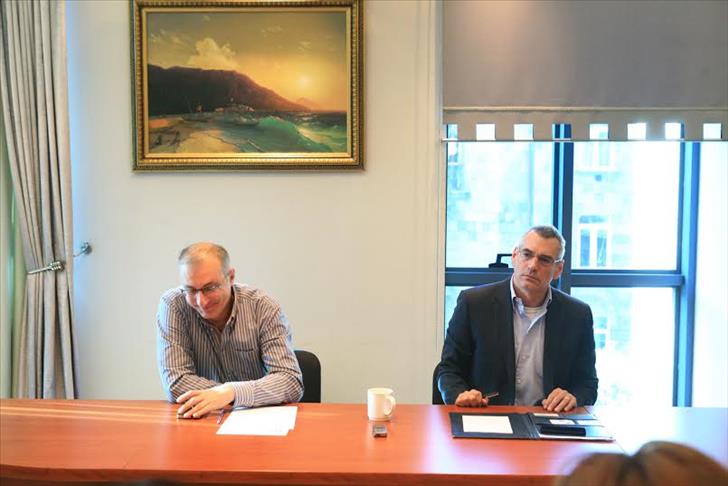
By Handan Kazanci
YEREVAN, Armenia
As the bitter Armenia and Azerbaijan conflict casts its shadow over stalled relations between Ankara and Yerevan, one American-Armenian expert tells Anadolu Agency that Baku needs to be part of Turkish-Armenian normalization.
Richard Giragosian, director of the Yerevan-based Regional Studies Center, says that Turkey and Armenia should correct "the mistakes of the past by normalizing relations more gradually so that Azerbaijan would be pressured to accept."
The conflict between Turkey’s two eastern neighbors over the disputed Nagorno-Karabakh territory has dragged on for decades. The often-violent conflict eventually saw Turkey close its border with Armenia in 1993.
Ankara has maintained relations with Azerbaijan ever since. Indeed, successive Turkish leaders have been at pains to emphasize the close cultural links between the two countries.
Turks and Azerbaijanis are mostly Muslim, speak a closely related language and have a common Turkic identity, all of which have -- at times -- put them at odds with their Armenian neighbors.
This closeness was articulated by the late Azerbaijani president Heydar Aliyev who described the relationship with Turkey as "one nation, two states."
An attempt was made to implement a protocol agreement between Ankara and Yerevan in October 2009 in Zurich, but this eventually failed. The deal would have begun moves to open the border between Turkey and Armenia and establish official relations.
Giragosian, whose grandfather was born in Turkey’s eastern province of Elazig, believes that "Turkey could contact with Azerbaijan as negotiations happen, not after."
Speaking to a group of Turkish and Armenian journalists who were in Yerevan in October, Giragosian said: "The Armenian/Turkish normalization process is one of the few issues where I support the Armenian government."
The need for normalization is partly found in the enduring disagreement between Turkey and Armenia over WWI-era accusations and counter-claims.
Events in 1915 -- which the Armenian diaspora and government describe as 'genocide' -- have severely damaged relations between the neighbors.
Turkey strongly rejects the Armenian allegation and says Armenians died in intercommunal fighting and starvation during their relocation in 1915. Turkey says many Turks also lost their lives in attacks carried out by Armenian gangs in Anatolia.
Giragosian is optimistic about normalization; "It was never supposed to be easy," he says, believing that the real obstacle to normalization is not in Ankara or Yerevan but in Baku.
"Azerbaijan is the number-one foreign investor in Turkey. And there was one important mistake from the [2009] protocol process; it was Turkey’s arrogance in underestimating the Azerbaijani reaction and overestimating its ability to persuade Baku," he says.
Nevertheless, Turkey and Azerbaijan have still developed strong cooperation in the energy and transport sectors. The Baku-Tblisi-Ceyhan Crude Oil Pipeline, Baku-Tbilisi Erzurum Natural Gas Pipeline and Baku-Tbilisi-Kars Railway Project are only some of the regional enterprises where the two countries have worked together.
"My vision of normalization is an open border, diplomatic relations as the first step to reconciliation and that’s when the genocide comes up. What this also means is a way to deal with our shared history," Giragosian says.
Giragosian says that there is a much more open space within Turkey on normalizing Turkey and Armenian relations, saying that he has been in Turkey for the past three years for 1915 commemorations with Turkish colleagues.
He recalls Turkey's then-prime minister – now president – Recep Tayyip Erdogan’s April statement which offered condolences over the Armenian deaths.
“This was an important and symbolic statement and I welcomed it,” Giragosian says.
“It reached those in the audience of [Turkey’s ruling] AKP supporters that previously were not comfortable with talking about the issue.
“The statement by Erdogan now made it possible to engage a new level of Turkish society, the hardcore of pro-Erdogan supporters,” he says.
He says that although Armenia and Turkey have no official diplomatic relations, Turkey’s last three foreign ministers have visited Yerevan.
Despite the closed border and frosty diplomatic tensions, trade – albeit small-scale – between Turkey and Armenia stubbornly refuses to disappear.
Economist and executive director of the Yerevan-based Caucasus Research Center, Heghine Manasyan, says that Turkey was the sixth major partner in terms of imports for Armenia after the E.U. countries, Russia and Georgia.
Manasyan also claims that there are a lot of Armenians traveling to Turkey and sending goods by plane or trucks back across the border to sell.
In 2008 Turkey had no exports to Armenia, according to Turkstat, Turkey’s statistics institution. This has since increased, if only marginally.
In 2009, the year the Zurich protocols were signed, exports were $2,000 but in 2012 they reached a high point of $241,000, according to Turkstat.
Speaking on Armenia’s becoming part of a Russia-led customs union – an alternative to the E.U. for Moscow and former Soviet countries – Manasyan says: “Most of the population here is surprised that we turned from the E.U. to Russia. For many experts it is the past, it is not the future.”
“It will be easier for Armenian businesses to sell goods or import things from these countries because of the common language – Russian – and a common culture,” she says.
Manasyan adds that the Russia-led Eurasian Economic Union requires fewer qualifications than E.U. regulations.
Nevertheless, for reconciliation between Armenia and Turkey, Azerbaijan remains the elephant in the corner of the room and it seems that Baku will continue to shape the Turkish-Armenian normalization process in the future.
Anadolu Agency website contains only a portion of the news stories offered to subscribers in the AA News Broadcasting System (HAS), and in summarized form. Please contact us for subscription options.

